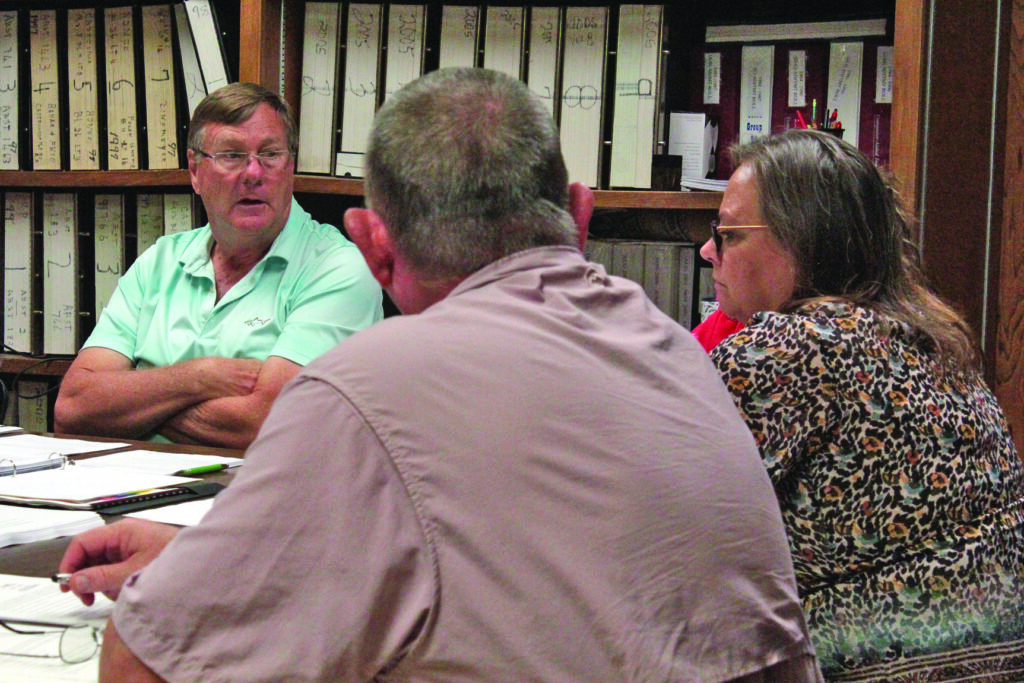Ag valuation to remain at 10 acres minimum, possible transition to
20 acres in future

By Anton Riecher
A recommendation by the Medina County Appraisal District’s agricultural appraisal advisory board to increase the minimum acreage to obtain an agricultural valuation from 10 to 20 acres has been rejected by Chief Appraiser Johnette Dixon for the time being.
Dixon’s decision followed MCAD’s bi-monthly board of directors meeting Jan. 10 in Hondo.
“After consideration of some of the points the Board of Directors brought up last night the minimum acreage for the agricultural valuation will remain at 10 acres with possible transition to 20 acres in the future,” Dixon said.
An agricultural valuation is not a tax exemption but a special valuation that allows property to be appraised based on the land’s capacity to produce agricultural products. For value purposes, if approved, the agricultural valuation supersedes the established market value of the property.
Dixon said the advisory board’s recommendation was based on concern about overgrazing.
“Basically, it is more of the brush properties that cannot support the animals and everything is being overgrazed,” Dixon told the MCAD board. “It’s not a pretty green hay field.”
District board vice chairman Jody Jacobs said there are no pretty green hay fields anywhere “unless they are running water on it.”
“What if someone can afford the feed necessary to run the animals they have on that,” he said. “Do we have the power to tell them they can’t do that or what?”
Dixon said she had conferred with MCAD’s attorney and that authority to increase the suggested minimum acreage lay solely within her discretion. Also, awarding agricultural valuation remains at the discretion of the MCAD staff with the suggested acreage serving.
“People don’t get ag just because they applied for it,” Dixon said. “We go out and make sure they are using it to the degree that it needs to be used and then we grant it. If not, we’ll deny it.”
Rather than a firm policy, district board chairman Tim Hardt said the suggested minimum acreage is simply a guideline. There is no minimum acreage specified in the Texas Tax Code which requires only that the land “be used to the degree of intensity for the area.”
Agricultural appraisal advisory boards have been required by state law since 1989 to help improve communications between the farming and ranching communities and the appraisal district. The board advises the chief appraiser on major issues dealing with agricultural appraisal, such as net to land and degree of intensity standards.
However, the advisory board has no decision making authority or responsibility.
Jacobs said he was unaware that the advisory board’s even existed.
“I couldn’t tell you who is on there,” Jacobs said. “I’m willing to bet there is a large number of our community in the same boat as me.” The recommendation put forward would be certain to create real estate development problems, he said.
Hardt said that the recommendation to increase acreage recommendation came as a surprise to district directors.
“Knowing my board, if this were a board decision I think we would have had discussion, talked to people and looked at the ramifications,” he said.
The recommendation “was not made by or necessarily condoned by this board,” Hardt said.
Deputy Chief Appraiser Randall Taylor said that increasing the minimum acreage requirement had is being pushed statewide by water providers. Many of the appraisal districts such as Bandera County have already increased the suggested minimum.
Board member Clay Bell countered that he’d “rather be last” to take such a step.
Hardt said he has served on the district board for 10 years. The 10-acre suggested minimum had been in place at least several decades before his arrival. However, an increase may still come in the future.
“I don’t have a problem with the concept,” Hardt said. “I have a problem with the sudden change and the public not knowing.”
In other action, the board discussed possible acquisition of property from the city of Hondo as the site for a new appraisal district headquarters building. Dixon reported that the city is open to the sale of two acres formerly used as a Little League field off Castro Street across from the Coor’s distributorship.
The city also indicated that two acres near the intersection of Avenue Y and Austin Avenue near the training center was available, she said.
“I don’t know if we need two acres,” Dixon said. “It would just be enough if we had future expansion.”
The district is considering the construction of a 5,000-square-foot metal building constructed with the possibility further expansion if needed. MCAD currently operates from 3,500-square-feet of rented office space described as crowded.
On a motion by Clay Bell, seconded by Cindy Segovia, the board voted to approve the 2022 profit and loss budget. The district ended the year with $158,207 in excess funds which the board carried over into its new budget with $28,207 going into equipment and $130,000 going into its building fund.
The board rejected Dixon’s proposal to pay for more than $35,000 in computer equipment from the excess, preferring that the money come from the 2023 budget. The $35,000 involved the purchase, installation and maintenance of six new computers plus a $20,000 server needed to replace out-of-date equipment.
Board secretary Mamie Navarro was absent from the meeting. The next meeting of the Appraisal District is scheduled for March 14.
Ag Advisory Board members are:
Hilton Stinson, Scott Saathoff, Jacob Schweers, Russell Roberson, and Vince Gilliam.
Appraisal District Board of Directors are:
Tim Hardt, Jody Jacobs, Mamie Navarro, Cindy Segovia, Clay Bell and Melissa Lutz
